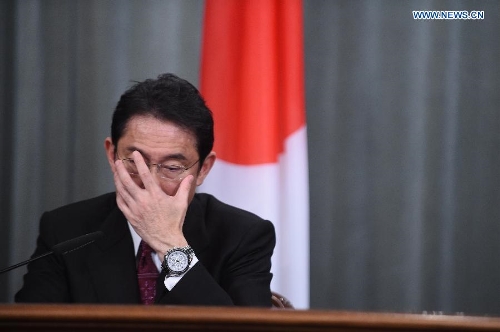Japan PM contender Kishida’s tough words on China merely blunt provocation from a US accessory

Fumio Kishida Photo: Xinhua
As a strong contender in the election of new president of Japan's Liberal Democratic Party (LDP) and Japan's new prime minister, former Japanese foreign minister Fumio Kishida has taken a very tough stance on China over recent days. He has claimed that once he is elected, dealing with China would be a top priority for his government.
Chinese people need to see clearly how some Japanese politicians have been acting as US accomplices. However, we should not be disturbed or restrained by these tough words. Japanese politicians only offer lip service. They dare not mount actual attacks against China, because they know that would make themselves nothing more than US cannon fodder. Today's landscape is fundamentally different to the First Sino-Japanese War (1894-95) or Japan's aggression against China (1937-45). The People's Liberation Army is now fully capable of completely defeating Japanese Self-Defense Forces.
Even Tokyo's American masters dare not have the idea of a military showdown against China, let alone Japan. Japan, Australia and some European countries are adopting an ever more hostile attitude toward China. The fundamental reason is the US has openly turned against China and required its allies to follow its suit.
Some Chinese netizens have complained: Why is China having more and more "enemies"? They think China itself should be blamed for this. Naïve!
As long as the US implements a containment strategy against China, then such a situation is inevitable. The US allies have followed Washington to use tough words and make hostile gestures against China. This is a must for these countries.
Besides, the US has the ability to rouse anti-China public opinion among its allies. This does not depend on the will of Chinese people. This is the inevitable collateral effect and cost after China's rising to become the world's second largest economy and its unprecedented increase in comprehensive competitiveness. We must endure the US-led political posturing of countries during this stage.
I think China has handled it pretty well. China and the US have been competing with each other, but trade between the two countries has maintained such a large scale. The US political elites had a strong intention to "decouple" from China, but they only succeeded in making some noise in the technological field, and their trade war with China aimed at "decoupling" has been disrupted to a considerable extent.
For its allies, the US has only leveraged their attitude toward China. It can be said that it is difficult for the US to essentially isolate China and it cannot turn China into another "Soviet Union" isolated from the West. While there is a lot of noise between China and the West, but both sides know they're inseparable.
Japan's image as an economic and technological powerhouse is much bleaker than it was at its peak. Its GDP is now only about a third of China's, its military spending is about a quarter of China's, and its role and options in its dealing with China are shrinking commensurate with its size and strength. Japan used to be a center of prosperity, but it is now turning itself into a corner of whining and anxiety.
I think Chinese people do not even need to have too much anti-Japanese sentiment in the future, because that would be too flattering. We should gradually establish a new attitude toward Japan by ignoring it and not entangling it in areas in which the two countries were once rivals. What we need to do is to continue to build up China and break the critical point at which Japan changes from "hating" China to "respecting" and "admiring" China, so as to lay a new foundation for China-Japan friendship. Japan is a snob; it will not set itself against the stronger power. So ultimately the question is: how do we make ourselves stronger and more powerful.
The author is editor-in-chief of the Global Times. opinion@globaltimes.com.cn

